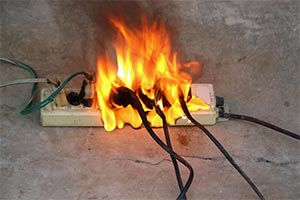Electrical fires do more than just damage your house – they put your family’s lives at risk. Though dangerous, they can be prevented. Using appliances like circuit breaker box and GFCI outlet wiring, you can prevent electrical fire ignitions at your home that lead to great loss of life and property.
Let’s look at some tips that can prevent electrical fires and keep you and your family safe.
7 Tips to Prevent Electrical Fire
1. Replace old wiring
If you see frayed, worn or broken wires, that means they are too old and need to be replaced. With old wiring, there is a risk of a short circuit or an electrical fire.
Repair or replace such wires immediately.
2. Don’t overburden electrical outlets
An electrical outlet gets overburdened when you plug too many appliances into the same outlet, extension or power strip.
It is recommended that you use a power strip that is equipped with overload protection. The strip will immediately shut off if it gets overloaded, thus preventing fires.
3. Replace damaged plug or cord
Apart from faulty wiring, if the plug is also damaged, there is a chance that it could lead to a fire. A damaged cord would expose the electrical system to several things including water. This could further result in a series of problems that can end in fires. 
The moment you see a worn out or damaged plug or cord, replace it.
4. Replace unsafe appliances and old sockets
All your electrical appliances should fall within the modern safety standards. Don’t buy them if they don’t adhere to the modern safety standards as they can pose serious fire risk.
Call a professional electrician to understand how to set up your connections. Ask them which are the best electrical appliances to add to the system to make it more stable.
If there are old sockets in the house, replace them too.
5. Unplugheat-producing appliances
Do you have heat-producing appliances like kettles, irons, hair straighteners, and curling wands? If yes, make sure you unplug them when they are not in use.
If they malfunction or are accidently left on for a long period of time, they can overheat and catch on fire. Be careful about using such appliances and always turn them off after use.
6. Use GFCI outlets
Make sure that rooms like kitchens, garages, and utility rooms are equipped with GFCI outlet (Ground Fault Circuit Interrupters outlet).
They ensure that you can use the appliances around water sources without being exposed to a risk of short circuit or electrical fires.
7. Look for signs of electrical trouble
There may be signs that indicate that one or more of your appliances is overheating. They may even indicate a problem with an electrical socket. Keep an eye out for signslike:
- An appliance, power cord or outlet feeling warm to the touch
- Discoloration or burn marks around a socket, light fixture or light switch
- A burning smell when an electrical appliance is plugged in or is being used
- Flickering of light even after you replaced the bulb
- The circuit breakers trip frequently or the fuse regularly blows
- You feel an electric shock every time you plug in a device
Stop using the outlet or the electrical appliance as soon as you notice one or more of these signs. Contact an electrician immediately and get the issue fixed.
5 Add-Ons to Keep your House Safe fromElectrical Fires
1. Circuit Breakers
A circuit breaker is a switching device that interrupts faulty or abnormal current in a circuit. It works by limiting the electric flow on the conductor when too many appliances are plugged in a circuit.
The circuit breaker is primarily designed for the closing or opening of an electrical circuit. This protects the electrical system from damageand helps in preventing electrical fires.
Install a circuit breaker box in your house without fail.
2. Arc-Fault Circuit Interrupter
An arc-fault circuit interrupter (AFCI) is a circuit protection device that is designed to protect you from electrical fires caused by arcing faults. It recognizes arc faults and de-energizes the circuit when one is detected.
It can detect a wide range of arcing electrical faults and help in reducing the electrical system from being an ignition source of fire. AFCIs are designed into conventional circuit breakers that combine traditional overload and short-circuit protect with arc fault protection. They look similar to GFCI protection and provides protection for the branch wiring circuit.
3. Smoke Detector
As the name suggests, a smoke detector can detect fire or smoke. There are different types of smoke detectors like ionization smoke detectors and photoelectric smoke detectors. The smoke detector should ideally have a long-lasting lithium battery.
Install them in all the rooms of the house and replace the battery as soon as the old one dies.
4. Out of Parameter Circuit Interrupter – Voltage type (OPCI-V)
An out of voltage parameter circuit interrupter (OPCI-V) is capable of detecting and protecting against electrical fires. They help in detecting abnormal line voltage, high-resistance connections, open neutral faults and damaged wiring to name a few.
This is an electronic circuit that measures the line voltage and compares it against the safe limits. If it detects abnormal conditions, it disconnects the load.
It provides reasonable protection against high-impedance connections and damaged wires, and good protection against voltage fluctuations.
The OPCI-V must be located in an electrical outlet, in series with the load and downstream of the fault location.
5. Service capacity
If you upgrade your home with more lighting, electronics or appliances, the home’s electrical service capacity may become overburdened. If you experience constant tripping of circuit breaker or fuse blows, you may have to increase the capacity of the electrical service.
Call a qualified electrician to determine the appropriate service requirements for your home.
Concluding Words
Follow the right electrical safety measures to protect your family from electrical hazards. Ensure the circuit breaker panels at your home are in the proper condition along with other protective add-ons.






